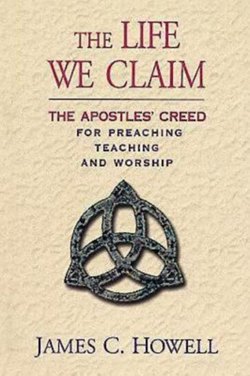Читать книгу The Life We Claim - James C. Howell - Страница 11
На сайте Литреса книга снята с продажи.
C h a p t e r T w o GOD THE FATHER ALMIGHTY
Оглавление_________________________________________________
LESSON 5
I BELIEVE IN GOD
I believe; help my unbelief! (Mark 9:24)
I wish I could devise the ultimate, compelling proof that God exists. Belief in God has always been hard, but we live in especially perilous times, as cynicism is in cahoots with apathy, with godlessness sprayed all over our culture. I have rational proofs in mind, but you can never compel another person mentally to believe, because belief is not merely mental. When we profess, "I believe in God," we cannot mean simply, "I think a supreme being exists," or even, "I have spiritual feelings in me." We mean something more all-embracing: we mean, "I commit myself to God."
In Old Testament times, if you asked someone on the street, "How many gods are there?" she would have answered, "Well, plenty, but we serve only one." Plenty of gods clamor for our attention, but what then do we mean by "god"? Martin Luther suggested that "whatever your heart clings to is really your god." To what do you cling? What ultimately matters to you? What motivates you? What can ruin your day? The question is: are you attached to something that is big enough to be God? or are you hooked on a mere pretender, or what in Bible times they called an "idol"?
Idols abound; John Calvin suggested that the human heart is a factory of idols. Martin Luther King, Jr. said that "there is so much frustration because we have relied on gods rather than God. We have genuflected before the god of pleasure only to discover thrills play out and are short-lived. We have bowed before the god of money only to learn there are such things as love and friendship that money can't buy."1 The false gods in our crazed culture peddle their wares, promising us the moon, but leaving us hollow, luring us (like the sirens of mythology) into shipwreck.
In the Bible, the one true God brooks no competition; God is a "jealous" God, not because God is small-minded and petty, but because God's love for us is so immense that God cannot stand idly by while we squander ourselves on what is a mere idol, on what will only chew away at whatever is good in the soul and leave us as superficial people with pointless lives. Belief in God excludes other loyalties. To believe is to make a choice, a real-life choice, about our priorities and about where we invest our time, our energy, our money, our heart. Lash zeroed in on this issue: "Christianity is an educational project, in which we may learn, however slowly . . . some freedom from the destructive bondage which the worship of any creature, however large or powerful, beautiful or terrifying, interesting or important, brings."2
How might we prove God's existence? No greater proof could be advanced than the changed lives of those who say they believe in God. Many disbelieve in God precisely because they look at believers and see nothing but a mirror image of the world that cares nothing for God. "I believe in God" is subversive, countercultural, life-changing. Because of God, I am different, you are different, we are different. Perhaps the problem today is not that people cannot mentally believe in God. Perhaps, instead, they would prefer to live without God. The problem isn't a lack of belief, but an unwillingness for our lives to be changed.
But then, our resistance to change is the most self-destructive stupidity of which we are capable, for the God who pleads for our belief, for our hearts, is the God who promises us the moon, but then gives us the stars, the God who is "the Father Almighty," the subject of our next lesson.
